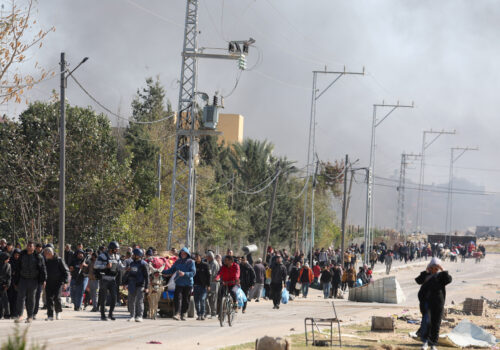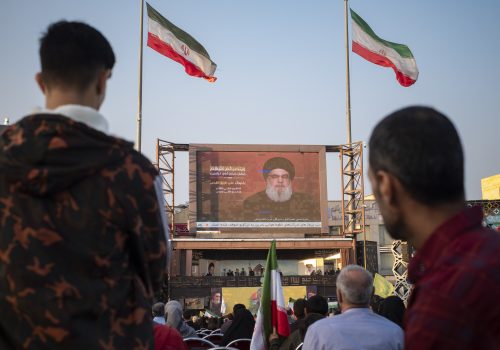Lebanon is using Hezbollah to blackmail Israel on border talks
War once again looms between Israel and Lebanese Hezbollah. After the last conflict between the two adversaries, the United Nations Security Council (UNSC) adopted Resolution 1701, which installed figurative guardrails to prevent renewed war. It demanded that Lebanon—which promised to send fifteen thousand of its soldiers to its frontier with Israel—control its territory and disarm Hezbollah, or at least relocate the group north of the Litani River. It also upgraded the mandate of the United Nations Interim Force in Lebanon (UNIFIL) to assist the Lebanese state in this task.
Those Resolution 1701 guardrails have proved illusory, with both sides incessantly trading cross-border fire for more than four months, and diplomats are now scrambling to prevent escalation. Rather than supporting these efforts, Lebanon is exploiting them. Instead of trying to constrain Hezbollah, Beirut—if not acting in concert with the group—is at least attempting to use its attacks as a bargaining chip—seeking to link an end of Hezbollah’s violence to a broader “package deal,” through which Lebanon can extract concessions from the international community and Israel.
Hezbollah began its latest attacks against Israel on October 8, 2023, to hamper Israel’s war efforts in the Gaza Strip. Initially, Lebanon’s caretaker Prime Minister Najib Mikati cautioned against “adventurism,” while the rest of the government remained largely silent about the attacks. But Mikati and other senior government officials soon shifted to cautious endorsement after Hezbollah Secretary-General Hassan Nasrallah said on January 5 that his group’s attacks were an “opportunity” for “Lebanon… to liberate every inch of our Lebanese land” along thirteen points of contention on the Blue Line, “from point B1 in Naqoura to Ghajar, to the Shebaa Farms and Kfar Chouba Hills.” Within days, Mikati was praising Hezbollah’s wisdom and characterizing its attacks against Israel as acts of self–defense, before officially aligning Lebanon’s position on a ceasefire in the south with Hezbollah’s, demanding a halt to Israel’s war in Gaza first.
Mikati’s subsequent attempts to walk back this alignment only entrenched it, particularly when he repeatedly echoed Nasrallah’s position that Lebanon was facing a “golden opportunity” to advance its position on territories disputed with Israel.
Foreign Minister Abdallah Bou Habib, meanwhile, described Hezbollah as “Lebanese who know” and seeking to secure “Lebanon’s interests.” He argued Lebanon would not try to silence Hezbollah’s guns—let alone consider disarming Hezbollah—until Israel settled all outstanding disputes. The Lebanese government, he reasoned, “doesn’t work for the Israelis to allow the[ir] settlers to return home” without gaining something in return. Bou Habib suggested Lebanon could hold out until these demands were met because it was long accustomed to instability.
As a result, diplomatic efforts to quell Lebanon’s desire to play with fire have gone nowhere. The Lebanese government seems to believe that it will get better terms as international desperation to stop Hezbollah’s attacks grows. That Western benefactors have reportedly floated a willingness to bankroll Lebanon’s failing economy to “sweeten the deal” only reinforces Beirut’s belief that this blackmail will ultimately be rewarded. Hezbollah may also believe that Washington’s eagerness to avoid an outbreak of another major war plays in its favor.
SIGN UP FOR THE THIS WEEK IN THE MIDEAST NEWSLETTER
Hezbollah and the Lebanese government are not wrong in assessing Washington’s fear of escalation. To understand the interplay of the Lebanese government and Hezbollah today, it is crucial to appreciate how the two worked in tandem during the Joe Biden administration’s January–October 2022 mediation of the Lebanese-Israeli dispute regarding where their maritime boundary ran through potentially lucrative offshore gas fields.
At the time, Hezbollah also detected a US desperation to avoid the outbreak of a major war in the Middle East while it was already confronting Russia’s invasion of Ukraine. The group decided to, in Nasrallah’s words, “exploit” the situation by repeatedly threatening war to force the Americans and Israelis into agreeing on the maritime border.
While this cooperation remained officially unacknowledged by Lebanon, the course of events made it obvious. First, Beirut would adopt a position, then Hezbollah would swiftly move to reinforce it through threats—hence why the group adhered to the more minimal but official demand for Line 23 and not, as one might expect, the more maximalist Line 29. Nor did Lebanon ever disavow Hezbollah’s general posture during negotiations; it only once criticized the group’s actions, and only under US pressure. Nasrallah, meanwhile, readily acknowledged this symbiosis, repeatedly saying that Hezbollah was only acting to advance the Lebanese national interest as expressed in the government’s positions.
On his last day in office, Lebanese President Michel Aoun described Hezbollah’s “initiative” as “useful,” but once again stopped sort of admitting coordination. By contrast, Abbas Ibrahim—the head of Lebanon’s General Security Directorate and the chief Lebanese interlocutor during the maritime negotiations—has effectively denied that the Lebanese side was so passive. In a post-retirement interview, he described himself working hand in glove with Hezbollah to achieve Lebanon’s national interests. He explained how, when the Lebanese side sensed any Israeli hesitation to meet a Lebanese demand, Hezbollah would act aggressively while Nasrallah passed threats of war through Abbas to Amos Hochstein, the chief US negotiator, who would then pressure Israel into a concession. So it went until the undeservedly celebrated Israel-Lebanon maritime border deal was signed on October 27, 2022—and even then, Hezbollah refused to consider the matter fully closed.
Nevertheless, at face value, the “package deal” being offered by Lebanon appears worthwhile. After all, Israel is seemingly only being asked to concede a few kilometers of irrelevant territory. In exchange, it would obtain not only a ceasefire on the northern border but full Lebanese compliance with Resolution 1701, allowing more than eighty thousand displaced Israeli citizens to safely return home by permanently resolving the perpetual threat Hezbollah poses to their lives.
But appearances are deceptive. Lebanon, by the admission of its officials, will never disarm Hezbollah. Bou Habib acknowledged that “would lead to a civil war, destroying the country.”
“Personally, if we have a choice between civil war and regional war,” he explained, Lebanon should choose regional war. Bou Habib also refused to guarantee that Hezbollah would willingly accept constraints. He said Hezbollah should grant concessions to the Lebanese state, adding, “We’ll see what happens.” However, Bou Habib stressed, “in the end,” Beirut simply “may not succeed.” With a war more destructive than any that Hezbollah and Israel have ever fought hanging over the region like the Sword of Damocles, it may be tempting to grasp for this illusionary carrot being offered by the Lebanese government. Lebanon may not be identical to Hezbollah, but it is hard to deny that Beirut is again seeking to make gains by taking advantage of the very real and dangerous stick being wielded by Hezbollah.
David Daoud is a senior fellow at the Foundation for Defense of Democracies (FDD), focusing on Hezbollah, Israel, and Lebanon issues. Follow him on X: @DavidADaoud.
Further reading
Thu, Jan 25, 2024
Can whatever remains of Hamas in Gaza be administratively and politically rehabilitated?
MENASource By Ahmed Fouad Alkhatib
The realities on the ground and Israel’s inability to fully eradicate Hamas necessitate addressing this uncomfortable question.
Thu, Jan 4, 2024
Here’s how Hezbollah will likely respond to Israel’s assassination of Saleh Al-Arouri
MENASource By David Daoud
What Hezbollah has not been seeking is opening a full-scale war with Israel. However, Hezbollah has other indirect options that it may activate.
Mon, Nov 6, 2023
The mouth of Hezbollah chief Hassan Nasrallah hath spoken—and nothing useful came out
MENASource By David Daoud
To avoid appearing weak against Israel to its supporters, Hezbollah is falling back on a pattern of using propaganda to cover its inaction against the Jewish state.
Image: Members of Lebanon’s Hezbollah wave Hezbollah and Lebanese flags during a rally marking the ninth anniversary of the end of Hezbollah’s 2006 war with Israel, in Wadi al-Hujeir, southern Lebanon August 14, 2015. REUTERS/Aziz Taher


